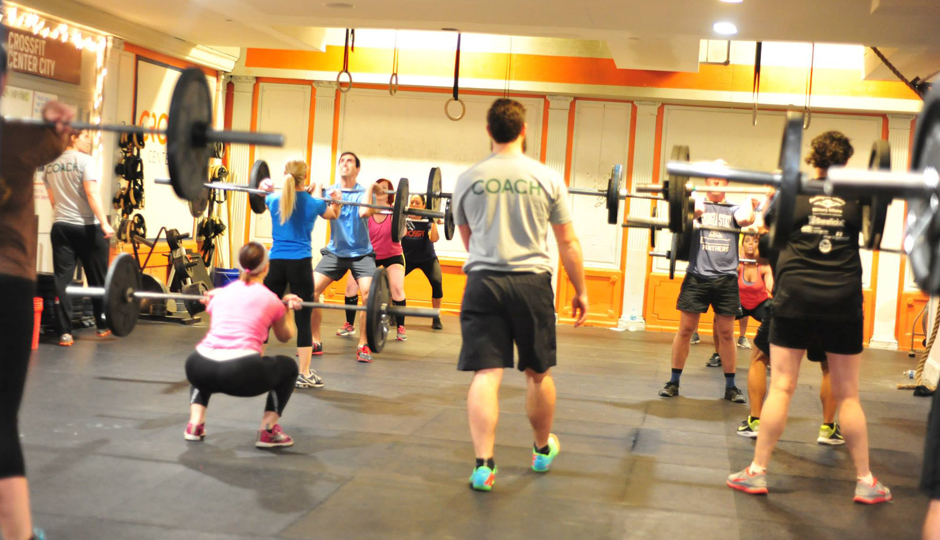Meet ULiftU, the New Philly Nonprofit Using CrossFit to Change Lives

CrossFit Center City
Earlier this week, I got an email from a guy named Wylie Belasik, pitching me an idea that sounded so smart and cool, I knew I just had to jump on it — and fast. He was starting a nonprofit organization called UliftU, he said, through which he intended to “train the homeless and unemployed for careers in the health and wellness industry.” The tactic: a nine-month training program, in partnership with CrossFit Center City, that includes job prep and fitness training to equip folks with the tools they need to build successful careers in the fitness industry. Neat, right?
If it all sounds a tiny bit familiar (*ahem* Back on My Feet *ahem*), there’s a good reason: Belasik was one of the original founders of BoMF — a Philly-grown national nonprofit that uses running as a tool for mentoring the homeless and pulling them out of poverty — and served as its vice president of programming for five years.
“What has been the biggest challenge for me was figuring how to have someone gain physical strength from sport, but also then directly translate that into an opportunity to break the cycle of poverty,” Belasik wrote. “Finding a solution there was the inspiration to start UliftU.”
Well, color me intrigued. Yesterday, I chatted with Belasik to find out more about how UliftU works and what he needs from the local community to get it off the ground. UliftU kicks off fundraising today, with a target launch date for its first group of recruits pegged for January. Here, how Belasik intends to pull it all off, in his own words.
Be Well Philly: Tell me a little bit about yourself. How’d you get to where you are today?
Wylie Belasik: I’ve been working in the field of sport for social change for 10 years now. It started with the formation of Back on My Feet. Myself and Ann Mahlum, the founder, started the organization in 2007. Athletically, I come from the competitive side of endurance sports. As a marathoner, I qualified for Boston five times, and then switched over to competing in Ironman. I went to the World Championships in 2013 and qualified again in 2014. I discovered CrossFit because I found the injuries I was having in endurance sports were a result of being extremely one-dimensional in my fitness. I could ride a bike all day but if I did 10 squats, I would fall down. CrossFit opened my eyes to a way to train that could make me a more well-rounded athlete.
What I really like about CrossFit, and why I chose this discipline, is that it’s infinitely scalable to anyone. With the skills you get as an instructor, you can run outdoor boot camps, be an instructor at a gym and, of course, work at a CrossFit box. You can do so much with it.
When I got into social justice, I had no previous background in social work or nonprofits, so I found out what works and what doesn’t by just trying a lot of different things. It was a great learning experience. As a result, I’ve become a huge believer and proponent for sport as a tool for social change. If you can get people moving, you can do so much more in terms of opening their eyes to all that they’re capable of.
My job at Back on My Feet was to manage programs around the country, get new chapters started in other cities, that kind of thing. Then I worked for a different nonprofit in Colorado for a couple years that worked with people in recovery from substance abuse, using rock climbing, CrossFit and yoga as a way to engage people in broader, sober communities that were also active. I liked the idea of connecting a person to a sport or active lifestyle, but the piece that I always felt was missing was the employment hurdle. For a lot of people coming out of homelessness or substance abuse, there are a lot of challenges to getting permanent employment. I wanted to leverage an industry where there’s upward mobility, and where that upward mobility is dependent on if you’re good at you do now, not on what you did in the past. So our goal is to prepare people to be successful and sustainable in their careers.
BWP: Run me through the nuts and bolts of the training program. How will it work?
WB: It’s a nine-month program broken into three trimesters, with people training in the program for 10 hours per week. Their time is divided between professional job-skill development and learning how to train people in CrossFit. So they’re getting skills like professionalism in the workplace and financial literacy, and tailoring it to the health and wellness industry; plus, they’re learning CrossFit so they can teach it to other people. At the end of the nine months, they’ll be equipped to take a CrossFit Level 1 exam. Our program is very structured in terms of week-by-week and month-by-month. We have specific skills that people will be gaining as they go along, so we’re confident they’ll get the skills they need.
BWP: I am definitely not be cut out to be a CrossFit trainer. Is there a screening process to make sure you’re getting the right kinds of candidates?
WB: We’re not saying everyone who graduates has to be trainer. But at the end of the program, they’ll have the chops to speak to the industry, and the skills they developed are transferrable to other things. As for finding the right candidates, we’ll take referrals from shelters and transitional housing in the city. They have our eligibility criteria, so they’ll refer to someone to us, and we’ll go through a process to see if it’s a good fit. We want groups no larger 10 at a time, and we’ll start new cohorts quarterly over the course of the year. We’re focusing on the quality, not quantity, and making sure we do it well.
BWP: How does CrossFit Center City figure into this?
WB: They’re very, very much our much our partner in this, and we couldn’t be more grateful to owner Erin Farmer and the whole crew for being so on board with what we’re trying to do: Participants in our program will do their training and certification at CrossFit Center City. At the moment, we’re also very much co-habitated — I’m working out of their basement. As UliftU grows, we hope to be able to find our own space.
BWP: What’s your fundraising goal? And what will funds be used for?
WB: Our goal is to raise half of our annal budget — $40,000 — by January. It costs $6,500 to support one person in our nine-month program. Each participant will earn $10 per hour as a stipend — it sets them up for a little bit of a nest egg when they graduate. They’ll also get a nutritional food share, which costs $100 a month, and we’ll cover their transporation so they can do their training here — that’s another $91 a month. Finally, we’ll also pay for their CrossFit certification, which is $1,000.
After they graduate from the program, our goal is to have contracts set up with facilities in underserved areas of the city, like West Philly. We want to give our graduates the skills to run programming in neighborhoods that don’t have a lot of access to fitness. So we are investing in our members, and what we’re asking people in the community to do is essentially to invest in a healthier Philadelphia. Our trainees will be taking skills back into communities where there are greater health issues and health costs that affect the whole city at large.
{You can learn more about UliftU by checking out the video below. Then head over to their website to see more.}
Like what you’re reading? Stay in touch with Be Well Philly — here’s how:
- Like Be Well Philly on Facebook
- Follow Be Well Philly on Twitter
- Follow Be Well Philly on Pinterest
- Get the Be Well Philly Newsletter


